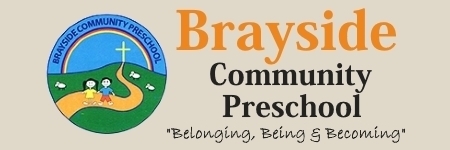Outdoor Learning Environments at Brayside Community Preschool
Mud pit and kitchen
In the mud kitchen children are transforming materials to make potions, foods, and all sorts of creative mixtures. Imaginations run wild as children work together to share ideas and replicate real life scenarios such as kitchen, restaurant and magical world play. In the mud pit we use our big muscles, developing gross motor skills by digging and lifting. Children problem solve and work together as they try and manipulate the path of the water from the handpump and creek bed. In this space children can get messy, and muddy and explore senses and textures fully.
Sandpit
Playing with sand is an early introduction to mathematical concepts such as size, volume and capacity. Children use trial and error, cause and effect and problem solving skills when they build dig and create. Social learning occurs when children learn to communicate with others, work cooperatively and use their language skills to socialise, play and create. Children are free to use their imaginations to feel a sense of confidence and pride in what they have built. Introduction of different materials offer sensory experiences including touch and texture, smell and colour.
Softfall and swings
Here we have our obstacle course, monkey bars and balancing practice spaces. Children experiment with risk as they challenge their physical capabilities and push through boundaries of fear and hesitation. In this area we are learning from each other as our peers encourage and inspire us. We use our imaginations as we construct adventures and descend into fantasy. This area is rich with affordance, an environment that suggests motivation and creativity.
Bike track, day bed and deck, fairy garden
This multi purpose space offers quiet and active play, places to rest and rejuvenate, and the imaginary play spaces of the cubby and fairy garden. We have taken the art outdoors and added easels on the grass area to explore colour mixing and painting, suggesting nature as inspiration for our painting.
Riding bikes develops gross motor strength, coordination and resilience and allows friends to unleash their need for speed as they race around the track with friends.
Grass space
Fundamental movement skills are developed in this space. Open areas allow for running, jumping, climbing, rolling and all sorts of play. Large scale building with boxes and large blocks allow children to explore scale. Ball games and large group games support teamwork, learning games with rules and turn taking. Soft green grass offers a sensory experience as children walk with bare feet and connect to the earth through touch. Our large grass space offers open ended experiences where children can transport materials and create their own worlds.
Garden
Children use play to investigate nature and explore the natural environment in collaboration with peers and educators. And recognise that they are part of natural ecosystems. Children learn to care for Country and connect with plants, animals, lands and waterways. Children explore the needs of living things and how to care for them, understanding that human needs are similar to plants and animals. Children observe and describe elements of weather and notice and respond to change. Taken from LO2 EYLF
Deck: STEM and loose parts space
Here we offer a range of evolving materials that offer open ended possibilities for use. Resources invite ideas, creativity and affordances for children. Variable materials support inventiveness and creative play. Skills associated with attaching and tying, cutting, building, measuring and planning are developed in this space. Resources can be moved and used in different play spaces as needed.
Cubby, platform and quiet garden
These enclosed spaces offer areas that invite role play and reality play. Shaping small worlds in miniature and connecting with friends in these spaces allow children to share friendships in alternate worlds. Home play and loose parts moved from other spaces support imagination, vocabulary development and idea development.
